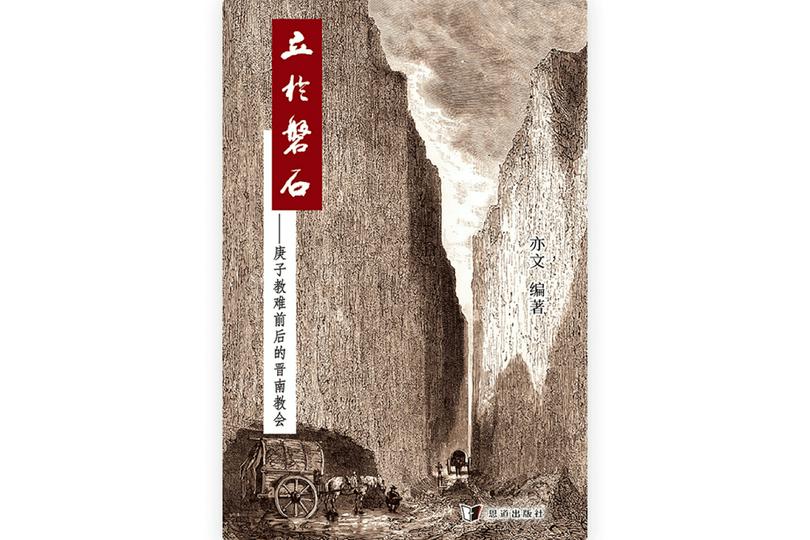On June 21, the inaugural lecture of the Standing on the Rock book launch series was held online, under the theme "The Chinese Church Needs Luke—Reflecting on the Value of Traditional Textual Ministry Through the Publishing Journey of Standing on the Rock."
The event was jointly organized by Inspirata Publishing (Hong Kong) and "Church China" and hosted by a representative from Inspirata Publishing. Brother Mark, an editor from "Church China," was invited as a guest speaker. The keynote address was delivered by Yi Wen, compiler and author of Standing on the Rock, who discussed the inspiration behind the book, its content and distinct features, and the significance of traditional literature ministry in the AI era.
Yi Wen holds a PhD in Law from Fudan University and a PhD in Sociology from Massey University. She is currently a freelance writer with a focus on compiling historical materials of evangelization, as well as teaching and research in mission history, missiology, and diaspora studies. She has authored numerous academic articles in various journals and participated in social research projects for government agencies.
The Inspiration Behind Standing on the Rock
The idea for Standing on the Rock originated from Yi Wen's engagement with a missionary biography based on "China's Millions." While adapting the story into a stage play, she was drawn to the original source material and began visiting libraries and seminaries across multiple cities and countries to examine the missionary journals firsthand, reading each page in detail.
"Every page tells a story about us Chinese, yet a story we've never known," she remarked. "China's Millions," an English journal, circulated in China for 77 years starting from 1875. Issued monthly, the publication provided detailed and systematic accounts of the China Inland Mission's (now OMF International) evangelistic efforts and church planting activities across China's provinces.
Subsequently, Yi Wen began translating the journal. Her translations were initially serialized in magazines such as Christian Times (Hong Kong) and Church China, eventually forming a collection of thematic volumes.
Content and Features of Standing on the Rock
In terms of structure and approach, Standing on the Rock adopts a method of "historical material compilation" rather than offering subjective commentary. Yi Wen emphasized the significant value of historical documents and advocated that they should be preserved in their original form as much as possible, enabling readers to engage with the material through their own backgrounds and church experiences.
Each article in the book is supplemented with contextual background and translator's notes, offering reflections relevant to today's context. The book is not merely a collection of archival records or an academic study; instead, it is a textual work that combines historical documentation with spiritual reflection—what Yi Wen describes as "a devotional book with annotations."
The book focuses specifically on "China's Millions" publications from 1899 to 1905, representing only a portion of the China Inland Mission's history. However, due to its narrative depth and detailed accounts, the book serves as an important lens to a broader historical insight.
Just as one must read the Bible in its full context, the understanding of one passage can reshape our interpretation of the entire Scripture. The accounts of churches affiliated with the China Inland Mission before and after the Boxer Rebellion, as presented in Standing on the Rock, provide valuable insights for the global church today and help correct previous misinterpretations of missionary efforts.
Yi Wen highlighted that history is not merely a record of the past but a discipline with its own methodology. Rather than commemorating the Boxer Rebellion solely through the lens of spiritual martyrdom, the book explores the event from the standpoint of "church governance," investigating how churches respond to crisis through reconstruction and rethinking of mission.
This perspective holds particular significance for today's Chinese church as it steps into cross-cultural evangelism. Yi Wen called on Christians to learn from both the wisdom and the failings of past missionaries, integrating those lessons into today's ministry and service.
Compared to existing Chinese-language works, Yi Wen believes Standing on the Rock stands out due to its "integrated capacity": it reflects the precision of a wordsmith, employs historical methodology and bilingual ability, and carries the lived perspective of a disciple involved in church life. These attributes together contribute to the book's unique depth.
Additionally, Brother Mark of Church China shared the concept of the "church beat"—a term likening church-centered news to specific news coverage categories. He emphasized that not every trending topic is relevant to the church beat. The church's essential mission is to proclaim Christ, worship, engage in discipleship, and participate in mission, rather than focusing on cultural exchange or church-state relations. In this light, Standing on the Rock offers a valuable model for interpreting history through an ecclesiological lens and urges researchers to ground documentary studies within a clear understanding of the church's identity and calling.
Traditional Literature Ministry in the Age of AI
Referring to the significance of literature ministry in the AI era, Yi Wen emphasized that the production of Standing on the Rock followed a traditional model of collaboration among authors, editors, and publishers. The publication underwent rigorous review and proofreading processes, including three rounds of editing and three rounds of proofreading, rather than relying on a one-person, self-media approach.
In an age dominated by AI-generated content and an overwhelming flood of textual material, the question arises: what is the value of originality? Yi Wen responded that, even if the writings by those in the literature ministry are not as refined as those by AI, their work is like an offering presented to God.
She also expressed concern that many gifted members find it challenging to persevere in the literature ministry due to the pressures involved and might choose to shift careers. This, she noted, is regrettable reality. In her view, professional writers are not isolated intellectuals working in ivory towers, but disciples rooted in church life who use their writing to serve the church.
Brother Mark responded with Chekhov's famous saying that there are big dogs and there are little dogs. Yet little dogs should not be ashamed of the presence of big dogs: everyone must bark—and bark in the voice God gave them.
Concluding the lecture, Yi Wen revisited the ending of her 2008 article, The Chinese Church Needs Luke, published in Church China. She noted that if she had not written that article, she would not have been able to reflect on her spiritual journey more than a decade later. The piece continues to be shared and cited, and she believes it may one day be regarded as an important historical document. "Paul rewrote history with his life, but when Luke recorded history with words, he too was shaping history, especially when the 'they' in Acts became 'us.' In doing so, Luke, the recorder, beme part of the story."
"As Christians use their various gifts to serve the Church and the body of Christ," she concluded, "their life testimonies become part of God's grecaater narrative."
Originally published by the Christian Times
- Edited by Katherine Guo and translated by Poppy Chan












